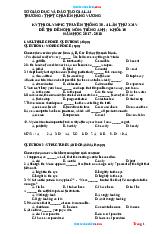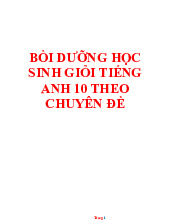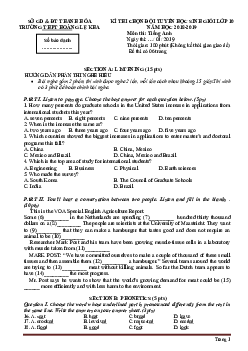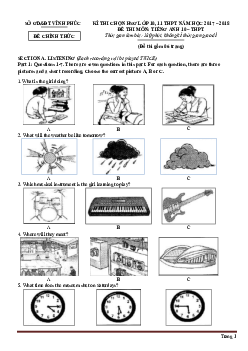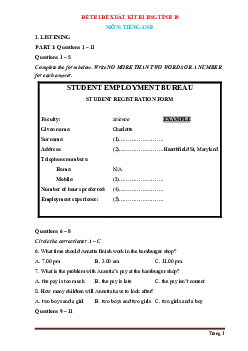







Preview text:
SỞ GIÁO DỤC&ĐÀO TẠO BẮC GIANG
ĐỀ THI HỌC SINH GIỎI CẤP CƠ SỞ
CỤM THPT HUYỆN SƠN ĐỘNG NĂM HỌC 2022 - 2023
Môn: Tiếng Anh - Lớp 10 ĐỀ CHÍNH THỨC
Thời gian: 120 phút (Không kể thời gian phát đề)
( Đề thi gồm có 07 trang) Mã đề thi
Họ và tên thí sinh:.............................................................................. SBD:..................... 101
A. PHẦN TRẮC NGHIỆM (70 điểm)
I. 9 Listening. (15 pts)
Part 1: You will hear a teacher talking to a group of students. Listen and choose the best answer A, B, C or
D. You will hear the recording TWICE. (5pts)
Question 1: The girl wants to change the current class because _________.
A. she doesn’t like her teacher
B. she finds it hard to understand her classmates
C. the class is too crowded
D. too many students share a language
Question 2: In the evening class, most students’ native language is _________. A. Japanese B. English C. Spanish D. Italian
Question 3: There is room in the new class because two students _________.
A. have gone home for holiday
B. have dropped out of the course
C. have transferred between classes
D. have graduated from the course
Question 4: The girl prefers the evening class because it is _________.
A. in the same room as the morning class
B. in the room next door
C. in the same building as the morning class
D. in the building next door
Question 5: The girl wants Mrs. Brooks to leave a message at _________. A. her class B. her workplace
C. her friend’s house D. her home
Part 2. You are given a piece of audio and five questions which correspond to the audio. Listen and choose
the best answer A, B, C or D. You will hear the recording TWICE. (5pts)
Question 6: What does the man want to do after he graduates?
A. He likes travelling around the area.
B. He'd like to work for a hotel in this area.
C. He wants to work as a business manager. D. He hopes to pursue higher education.
Question 7: What is the woman majoring in? A. administration B. linguistics C. French D. computer science
Question 8: How does the woman pay for college?
A. She herself pays for tuition fee.
B. She has a part-time job.
C. She receives a scholarship.
D. Her parents are paying for it.
Question 9: Where does the man work part-time?
A. in a library in his school
B. at a bakery near campus
C. at a restaurant near campus
D. in a hotel near his school
Question 10: Which of the following is NOT mentioned about the man’s job?
A. His co-workers are friendly.
B. He works long hours. C. The pay is okay.
D. He works 3 times a week.
Part 3. You are given 5 pieces (from 1 to 5) of audio. Listen and choose the best answer A, B, C or D for the
questions from 11 to 15 which correspond to the audio respectively. You will hear the recording TWICE. (5pts)
Question 11: Where is Angela working at the moment? A. in Britain B. in the USA C. in Asia D. in Brazil Trang 1
Question 12: Angela likes her job because _________.
A. she loves being in dangerous situations
B. she never knows where she’ll go next
C. she enjoys watching important events happen
D. her job doesn’t have any disadvantages
Question 13: What did Angela bring home from Hong Kong? A. pictures B. carpets C. furniture D. bits of art
Question 14: What time does Angela’s working day begin? A. 8.00 a.m. B. 8.30 a.m. C. 10.00 a.m. D. 6.30 a.m.
Question 15: What does Angela do to relax? A. She goes sailing.
B. She goes for a walk. C. She cooks a meal. D. She goes shopping.
F 9 === THE END OF THE LISTENING === 9 E
Mark the letter A, B, C or D on your answer sheet to indicate the word whose underlined part is pronounced
differently for the questions from 16 to 17.
Question 16: A. coffee B. committee C. referee D. cookie Question 17: A. holds B. notes C. replies D. sings
Mark the letter A, B, C or D on your answer sheet to indicate the word that differs from the rest in the
position of the main stress for the questions from 18 to 20. Question 18: A. attend B. appear C. anthem D. apply
Question 19: A. catastrophe B. agriculture C. dictionary D. supervisor
Question 20: A. potential B. understand C. recommend D. volunteer
Mark the letter A, B, C, or D on your answer sheet to indicate the best answer to complete each of the
following sentences for the questions from 21 to 34.
Question 21: John: “Do you think we should use public transport to protect our environment?”
Laura: “________________”
A. Of course not. You bet!
B. Well, that’s very surprising.
C. There’s no doubt about it.
D. Yes, it’s an absurd idea. Question 22:
Phuong Thao: “You must have found reading my essay very tiring.”
Ms Lan: “_____________. I enjoyed it.”
A. Not in the least B. Just in case C. At all costs D. You are welcome
Question 23: The company management decided to ___________ more workers to meet the production schedule. A. take on B. make out C. take over D. make up
Question 24: If John gets into trouble, it’s his own fault. I personally won’t _______ to help him. A. shake a leg B. bend his arm C. raise a finger D. open an eye
Question 25: He was charged with possessing a ________ passport. A. fake B. artificial C. mock D. copy
Question 26: Actually, I ___________ a cup of tea first thing every morning but then I switch to coffee. A. do drink B. am drinking
C. have drunk D. have been drinking
Question 27: The coastguard boarded the ship and found___________
A. four injured alive men
C. four injured men alive
B. alive four men injured
D. injured four alive men
Question 28: I started doing my homework when I got home from school but I stopped ___________ my favorite show. A. watch
B. to watch C. watching D. from watching Trang 2
Question 29: My dad says he once met Robbie Williams when he was still___________ A. unknown B. infamous C. hidden D. unrelated
Question 30: The candidate must be willing to _______ in area and be active in the community.
A. residential B. resident C. reside D. residence
Question 31: There weren’t many vegetarian dishes _____________, although there were several different kinds of cheese. A. like that B. as such C. such that D. such like
Question 32: It’s very important that we ___________ as soon as there’s any change in the patient’s condition. A. be it notified
B. being notified C. were notified D. be notified
Question 33: The woman___________ is being held at Grandchester Police Station
A. who arrested B. arresting C. arrested D. was arrested
Question 34:You ___________ that film last week - it was only released yesterday. A. can’t have seen C. mustn't have seen B. couldn't see D. didn't need to see
Mark the letter A, B, C or D on your answer sheet to indicate the underlined word or phrase that must be
changed in order for the sentence to be correct for the questions from 35 to 38.
Question 35: Laura expected to give her mother a hand in housework at the weekend, but she did nothing. A. expected
B. a hand C. but D. nothing
Question 36: Uncle has gone to Nha Trang on vacation, but I wish he is here so that he could help me repair my bicycle. A. could help B. has gone C. he is D. on vacation
Question 37: I made it clear to them that I would like my house to be painted white through.
A. clear B. would like C. to be painted D. through.
Question 38: The bones of the elderly are more prone to fractures than of young people. A. the elderly B. more C. to D. of
Mark the letter A, B, C, or D on your answer sheet to indicate the word(s) CLOSEST in meaning to the
underlined word(s) for the questions from 39 to 40.
Question 39: Biologists have introduced a global list of endangered and vulnerable animal species. A. rare and specious
C. weak and easily hurt
B. small but invaluable D. strong and unusual
Question 40: The overall aim of the book is to help bridge the gap between theory and practice,
particularly in language teaching.
A. increase the understanding B. reduce the differences
C. minimise the limitations D. construct a bridge
Mark the letter A, B, C, or D on your answer sheet to indicate the word(s) OPPOSITE in meaning to the
underlined word(s) for the questions from 41 to 42.
Question 41: Formal dress is compulsory at this meeting where a lot of big figures will show up. A. optional B. obligatory C. necessary D. unavoidable
Question 42: It's time you pulled your socks up and started working seriously. Your final exams are coming.
A. became lazy B. lost confidence C. studied harder D. got furious Trang 3
Mark the letter A, B, C, or D on your answer sheet to indicate the sentence that is CLOSEST in meaning
to each of the following questions from 43 to 45.
Question 43: She last had her eyes tested ten months ago.
A. She had tested her eyes ten months before.
B. She had not tested her eyes for ten months then.
C. She hasn’t had her eyes tested for ten months.
D. She didn’t have any test on her eyes in ten months.
Question 44: “I am sorry, I forgot our appointment yesterday,” said Jean to the dentist.
A. Jean apologized the dentist for having forgotten our appointment the day before.
B. Jean apologized to the dentist for having forgotten their appointment the day before.
C. Jean apologized the dentist having forgotten their appointment the day before.
D. Jean apologized to the dentist for having forgotten our appointment the day before
Question 45: There are so many traffic accidents because of the drivers' carelessness.
A. If the drivers are not careless, there will not be so many traffic accidents.
B. If the drivers were not careless, there would not have been so many traffic accidents.
C. If the drivers had been careful, there would not have been so many traffic accidents.
D. Were the drivers not careless, there would not be so many traffic accidents.
Mark the letter A, B, C, or D to indicate the sentence that best combines each pair of sentences in the
following questions from 46 to 48.
Question 46: She applied for the job abroad. She wanted to develop herself and earn more money.
A. She applied for the job abroad in order to develop herself and earn more money.
B. So as to earn more money for development, she applied for the job abroad.
C. She applied for the job abroad, so she developed herself and earn more money.
D. To earn more money was the reason why she applied for the job abroad.
Question 47: You are in this mess right now. You didn’t listen to me in the first place.
A. If you listened to my advice in the first place, you wouldn’t be in this mess right now.
B. If you had listened to my advice in the first place, you wouldn’t be in this mess right now.
C. If you listen to my advice in the first place, you will not be in this mess right now.
D. If you had listened to my advice in the first place, you wouldn’t have been in this mess right now.
Question 48: Mary was not here yesterday. Perhaps she was ill.
A. Mary needn’t be here yesterday because she was ill.
B. Because of her illness, Mary shouldn’t have been here yesterday.
C. Mary might have been ill yesterday, so she was not here.
D. Mary must have been ill yesterday, so she was not here.
Mark the letter A, B, C or D on your answer sheet to indicate the correct answer to complete the following
passage for the questions from 49 to 55.
Today computers come ____ (49) all shapes and sizes. There were still big computers for companies
or universities. There are other special computers for factories. These large computers tell the factory
machines ____ (50) to do. But there are also small ____ (51) computers to use at home or in an office. There
are even computers in telephones, television sets and cars. These computers have to be small. They are so
small that you cannot even see all their parts.
Computers are very useful, but they also can ____ (52) problems. One kind of problems is with the
computer's memory. It is not perfect so sometimes computers ____ (53) important information. Another
problem is with the machinery. Computers are machines, and machines can break down. When the
computers break down, they may ____ (54) information, like chalk on a blackboard. Or they may stop doing
anything at all. And there is ____ (55) different kind of problem with computers. Some doctors say they may
be bad for your health. They say you should not work with computers all day. Trang 4
Question 49: A. at B. in C. under D. with
Question 50: A. everything B. something C. what D. thing
Question 51: A. personal B. private C. individual D. owner's
Question 52: A. get B. cause C. suffer D. gain
Question 53: A. lose B. miss C. misplace D. misunderstand
Question 54: A. clean B. erase C. wipe D. scrape
Question 55: A. yet B. other C. more D. another
Read the passage and mark the letter A, B, C or D on your answer sheet to indicate the correct answer to
each of the following questions from 56 to 63.
In the history of technology, computers and calculators were innovative developments. They are
essentially different from all other machines because they have a memory. This memory stores
instructions and information. In a calculator, the instructions are the various functions of arithmetic,
which are permanently remembered by the machine and cannot be altered or added to. The information
consists of the numbers keyed in.
An electronic pocket calculator can perform almost instant arithmetic. A calculator requires an input
unit to feed in numbers, a processing unit to make the calculation, a memory unit, and an output unit to
display the result. The calculator is powered by a small battery or by a panel of solar cells. Inside is a
microchip that contains the memory and processing units and also controls the input unit, which is the
keyboard, and the output unit, which is the display.
The input unit has keys for numbers and operations. Beneath the key is a printed circuit board
containing a set of contacts for each key. Pressing a key closes the contacts and sends a signal along a
pair of lines in the circuit board to the processing unit, in which the binary code for that key is stored
in the memory. The processing unit also sends the code to the display. Each key is connected by a
different pair of lines to the processing unit, which repeatedly checks the lines to find out when a pair is linked by a key.
The memory unit stores the arithmetic instructions for the processing unit and holds the temporary
results that occur during calculation. Storage cells in the memory unit hold the binary codes for the
keys that have been pressed. The number codes, together with the operation code for the plus key, are
held in temporary cells until the processing unit requires them. When the equals key
is pressed, it sends a signal to the processing unit. This takes the operation code-for example,
addition-and the two numbers being held in the memory unit and performs the operation on the two
numbers. A full adder does the addition, and the result goes to the decoder in the calculator's
microchip. This code is then sent to the liquid crystal display unit, which shows the result, or output, of the calculation.
Question 56: The word "innovative" in line 1 of paragraph 1 could best be replaced by _ . A. recent
B. important C. revolutionary D. complicated
Question 57: What can be inferred about machines that are not calculators or computers?
A. They cannot store information in a memory.
B. They are less expensive than computers.
C. They have simple memory and processing units.
D. They are older than computers.
Question 58: In what part of the calculator are the processing and memory units?
A. the battery B. the solar cells C. the output unit D. the microchip
Question 59: According to the passage, one function of the memory unit is .
A. to control the keyboard
B. to store temporary results during calculation
C. to send codes to the display unit
D. to alter basic arithmetic instructions Trang 5
Question 60: The word "This" in paragraph 5 refers to . A. the plus key
B. the processing unit C. the memory unit D. the equals key
Question 61: The word "contacts" in paragraph 3 is closest in meaning to . A. commands B. codes C. locations D. connections
Question 62: Which of the following could NOT be said about calculators?
A. The calculator's "thinking" takes place in the processing and memory units.
B. Calculators require a lot of instructions to operate quickly.
C. Calculators and computers are similar.
D. Pressing a key activates a calculator.
Question 63: What is the main purpose of the passage?
A. To discuss innovative developments in technology
B. To compare computers and calculators with other machines
C. To summarize the history of technology
D. To explain how a calculator works
Read the passage and mark the letter A, B, C or D on your answer sheet to indicate the correct answer to
each of the following questions from 64 to 70.
In many modern countries, people think of a family as a mother, a father and their children. But this is
not the only kind of the family group. In some parts of the world, a family group has many other members.
This kind of large family is called an "extended family" or a "joint family".
The joint family includes all living relatives on either the mother's or the father's side of the family. It is
made up of grandparents, parents, brothers, sisters, uncles, aunts, and cousins. They live together in a large
house or in huts built close together.
Early people probably lived in joint families. They had to be part of a large group in order to survive.
The members of the group helped each other hunt. They worked together to protect themselves from
dangerous animals and other enemies.
In China, people lived in joint families. When a son married, he and his 'wife lived at his parents' home.
Unmarried daughters remained at home until they married. Chinese children felt very loyal to their parents.
Younger members of the joint families always took care of the old ones.
In India and Africa, some people still live in joint families. The members of a joint family share their
earnings and property. If one member of the group becomes ill or has bad luck, the others help the person.
As in the past, the members of the joint family offer each other help and protection.
Question 64: What is the main idea of the passage? A. all types of family B. families in China C. joint families
D. families found in India and Africa
Question 65: The word "They" in paragraph 2 refers to ______.
A. huts B. early people C. modern countries D. large houses
Question 66: The phrase "is made up of” in paragraph 2 could be best replaced by ______. A. includes B. lives C. forms D. creates
Question 67: According to the passage, people who live in joint families often ______.
A. don’t share their good or bad luck
B. hate remaining at home until they married
C. take care of one another
D. feel very indifferent to their parents
Question 68: Chinese people felt loyal to their ______. A. relatives
B. cousins C. parents D. younger members
Question 69: In India and Africa, people in joint families help person when ______. A. He has good luck B. he has bad luck
C. he gets rich of illness
D. he shares them his earnings.
Question 70: Which of the following is NOT TRUE?
A. A joint family is a large family. Trang 6
B. Chinese children always took care of their parents.
C. The members of the joint family used to be very helpful and protective.
D. The joint family is not popular nowadays.
B. PHẦN TỰ LUẬN (30 điểm)
I. Complete the second sentence so that it has a similar meaning to the first sentence, using the word
given. Do not change the word given. You must use from THREE to FIVE words, including the words
given in capital. (15 pts.)
1. It began to rain almost immediately after our arrival at the resort. (WE)
è Scarcely ___________________________________at the resort when it began to rain.
2. On business trips, I prefer driving home to staying in a hotel overnight. (RATHER)
è On business trips, I’d _________________________________________ in a hotel overnight.
3.It took Layla five minutes to find her car keys. (SPENT)
è Layla __________________________________________________for her car keys.
4. My advice to you is to reduce the amount of time spent on the Internet immediately. (WERE)
è If ________________________________, I would reduce the amount of time spent on the Internet immediately.
5. “ Why didn’t you attend the meeting last night, Jim?” Jenny asked. (HAD)
èJenny asked Jim ________________________________________ the meeting the night before.
6.It is rumoured that the towers were built very long ago. ( HAVE)
è The towers are _________________________________________ very long ago.
7. Without your assistance, I could never have done this job so well. (ASSISTED)
è Had ______________________________, I could never have done this job so well.
8. I find his handwriting very hard to read. (DIFFICULTY)
è I ________________________________________________his hand writing.
9. Although his leg was broken he managed to get out of the car. ( HAVING)
èIn spite of _______________________________, he managed to get out of the car.
10. She has never seen a more unusual festival than this. (MOST)
èThis is _________________________________ she has (ever) seen.
II. WRITING (15 pts.)
Write a paragraph (120 -150 words) about the benefits of volunteering activities.
----------- THE END ----------
SỞ GIÁO DỤC&ĐÀO TẠO BẮC GIANG HƯỚNG DẪN CHẤM
CỤM THPT HUYỆN SƠN ĐỘNG
ĐỀ THI HỌC SINH GIỎI CẤP CƠ SỞ NĂM HỌC 2022 - 2023 Môn: Tiếng Anh - Lớp 10
(Bản hướng dẫn chấm có 03 trang)
A. PHẦN TRẮC NGHIỆM: Gồm 70 câu – mỗi câu đúng được 1 điểm) 1 D 11 A 21 C 31 B 41 A 41 A 61 D 2 C 12 C 22 A 32 D 42 A 42 A 62 D 3 B 13 C 23 A 33 C 43 C 43 C 63 D 4 D 14 B 24 C 34 A 44 B 44 B 64 C 5 C 15 A 25 A 35 A 45 D 45 D 65 B Trang 7 6 B 16 C 26 A 36 C 46 A 46 A 66 A 7 D 17 B 27 C 37 D 47 B 47 B 67 C 8 C 18 C 28 B 38 D 48 C 48 C 68 C 9 C 19 A 29 A 39 C 49 B 49 B 69 B 10 B 20 A 30 C 40 B 50 C 50 C 70 D
B. PHẦN TỰ LUẬN( 30 điểm)
I. Gồm 10 câu – mỗi câu đúng được 1.5 điểm = 15 điểm
1. Scarcely had we arrived at the resort when it began to rain.
2. On business trips, I’d rather drive home than stay in a hotel overnight.
3. Layla spent five minutes looking / searching for her car keys.
4. If I were you, I would reduce the amount of time spent on the Internet immediately.
5. Jenny asked Jim why he hadn’t attended the meeting the night before.
Jenny asked Jim why he had not attended the meeting the night before.
6. The towers are rumoured to have been built very long ago.
7. Had you not assisted me, I could never have done this job so well.
8. I have difficulty (in) reading his hand writing.
9. In spite of having a broken leg, he managed to get out of the car
10. This is the most unusual festival she has (ever) seen.
II. 15 điểm
Các tiêu chí chấm bài viết đoạn văn.
Nếu lạc đề, bài viết sẽ bị điểm không (0) Tiêu chí
Mô tả tiêu chí đánh giá Điểm tối đa
Đúng cấu trúc, bố cục của đoạn văn:
ü Có câu chủ đề (topic sentence) mạch lạc, đúng chủ đề 0,5
ü Các câu văn chứng minh, diễn giải (supporting sentences) rõ 2,0 Bố cục
ràng, hợp lí (có ít nhất 2 câu)
ü Câu kết (concluding sentence) rõ ràng, tóm tắt được chủ đề và 0,5 các ý đã triển khai
ü Viết đúng chủ đề, mạch lạc, nêu được các lập luận 1,0 Nội dung,
ü Các ý minh họa logic, có tính thuyết phục 1,0 phát triển ý
ü Liên kết các ý chặt chẽ (Sử dụng từ nối, liên từ phù hợp) 1,0
ü Đảm bảo số lượng từ theo yêu cầu 1,0 Ngôn ngữ,
ü Sử dụng ngôn từ phù hợp với chủ đề, phù hợp với văn viết 1,0 trình
ü Đa dạng về cấu trúc và từ vựng, hạn chế lặp lại từ vựng 1,0 bày
ü Sử dụng đúng dấu câu, cấu trúc, thời thể đúng ngữ pháp 1,0 Tổng điểm 10
Cách tính lỗi (trừ điểm) - Xuống dòng -5,0
- Số lượng từ (+ - 20% số từ theo quy định) -1,0
- Mỗi lỗi ngữ pháp, cấu trúc câu, dấu câu, …. -0,25
- Mỗi lỗi từ vựng -0,25 Trang 8
